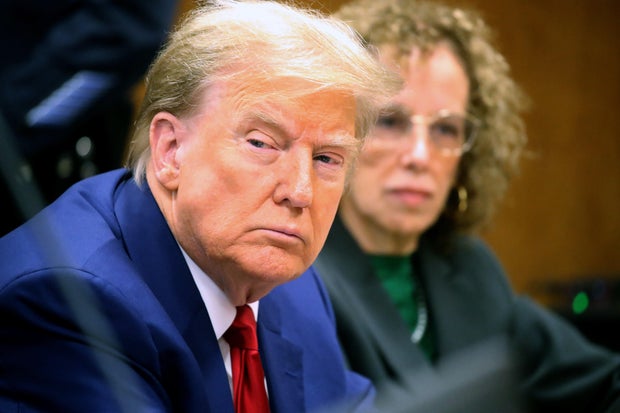Former President Donald Trump is attending a high-stakes court hearing Monday in Manhattan, less than three weeks before the scheduled start of his criminal trial — a proceeding that would be a first in U.S. history.
The trial was originally scheduled to begin Monday in the case, which centers around what Manhattan District Attorney Alvin Bragg has said were falsified business records tied to reimbursements for a “hush money” payment to an adult film star, Stormy Daniels.
Trump called the prosecution a “witch hunt” and a “hoax” as he entered the courtroom with a somber expression Monday morning. He has pleaded not guilty to the charges.
The trial schedule was derailed in early March when the Justice Department turned over new material relevant to the case to the two sides. Judge Juan Merchan called Monday’s hearing to resolve issues surrounding the new documents.
Monday’s hearing
Trump’s defense had asked for either a lengthier trial delay — up to three months — or an outright dismissal, accusing Bragg’s office of purposely conducting an inadequate effort to get the documents. Prosecutors said they requested the documents last year, and the Justice Department initially declined, only to reverse course in response to a defense subpoena.
The documents that were turned over in early March totaled more than 100,000 pages relating to, among other things, bank records and related emails concerning a Justice Department investigation into Michael Cohen, Trump’s former “fixer” and lawyer, according to court filings. Cohen entered a guilty plea to tax evasion in 2018 in the federal case, and is now the key witness against Trump in the New York case.
At Monday’s hearing, Merchan said that he wanted to determine who is responsible for the document issues and what sanctions, if any, are required to resolve the dispute. He noted that there were “not significant questions of fact to resolve.”
Merchan added that the question is “how we characterize the nature and scope” of the state’s obligation to produce documents to the defense, a process known as pretrial discovery. The district attorney’s office argued that they were not obligated to produce the Justice Department documents. Prosecutor Matthew Colangelo said that the number of records that are relevant to the case is relatively small — about 300 out of 100,000.
Todd Blanche, an attorney for Trump, argued that “thousands and thousands” of records were potentially relevant, and that the defense needed more time to sort through them. He also revealed that federal prosecutors informed him late Sunday night that they intend to hand over more records related to Daniels, whose real name is Stephanie Clifford.
Merchan questioned Blanche about his accusation that the district attorney’s office deliberately withheld material from the defense that it was required to hand over. He said the defense’s motion to dismiss cited a law that says prosecutors must produce material from any office under its purview. Merchan asked Blanche if there’s any case that shows the federal U.S. Attorney’s Office is under the local prosecutors’ auspices.
“That you don’t have a case to cite right now is really disconcerting, because all the allegations that the defense makes is incredibly serious, unbelievably serious,” Merchan said, his voice rising. “You are literally accusing the Manhattan D.A.’s office and the people assigned to this case of prosecutorial misconduct, and trying to make me complicit in it, and you don’t have a case to cite?”
In an earlier order, Merchan set the April 15 trial date, but added, “The court will set the new trial date, if necessary, when it rules on Defendant’s motion following the hearing.”

